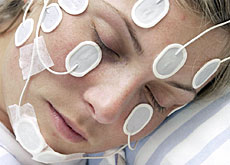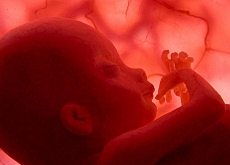Designer babies divide opinion

A controversy has broken out over whether techniques that are banned in Switzerland to produce so-called designer babies should be approved.
Public debate on the issue was reignited after a Swiss couple used Belgian medical assistance to conceive a second child to help cure their first-born, who suffers from a rare immune disorder.
This involved the prohibited procedure pre-implantation genetic diagnosis (PGD), (see related video). The process includes in vitro fertilisation, after which healthy embryos can be selected for implantation in the prospective mother’s womb.
For Christian Democratic parliamentarian Kathy Riklin, approving the use of PGD in Switzerland would be akin to opening a Pandora’s box.
“Embryo selection makes sense for carriers of genetic diseases but there are ethical concerns… especially as it paves the way to producing children to order,” she told swissinfo.
In Riklin’s view, the notion of designer babies is dangerous and could lead to disabled people being ostracised by society.
“Selectively breeding people is a large concern – it leads to the notion that one can rear perfect people.
“Disabled people might no longer have a place in society, [people might think] that they don’t have a right to life because such disabilities could have been prevented by PGD,” Riklin said.
The main difficulty, however, lies in knowing where to draw the line because taking the argument to its logical conclusion, no children would be born naturally and all embryos would be scanned for illnesses, according to Riklin.
She is also concerned that the Swiss have enough spending power to finance the creation of a perfect test-tube baby.
“We are a rich country and can afford a lot. But unfortunately we are not ready to spend money on the millions of children in the world who live in poverty, are sick and starving, and who could be cured with basic medicines,” she said.
Tough ride
The Swiss National Advisory Commission on Biomedical Ethics also faced a struggle when it deliberated on to what extent PGD should be permitted in Switzerland.
Its president, Christoph Rehmann-Sutter, told swissinfo that the majority of the commission was in favour of liberalising the law. But they did not go as far as recommending that parents be allowed to use PGD to produce a disease-free child in order to cure another one of their children.
“If you allow this, you create a pressure on all those families who already have a child suffering from such a disease to go in that direction and to have another child,” he explained.
“[These] parents have an existing moral responsibility towards their suffering child and they probably cannot say no to such an offer.”
It would, however, be permissible for carriers of an immune disorder to use PGD to fulfil their wish of having a healthy child, should they not already have children.
Simplistic approach
Gen Suisse, a foundation promoting dialogue on gene technology, goes further than the commission, saying that parents should be permitted to conceive a second child with PGD to help cure another, especially if the condition would lead to an early death.
“It is too simple to say that one should not do this because who can imagine the fears of parents [in this situation]?” director Daniela Strebler told swissinfo.
But Gen Suisse is in favour of strict regulation and an expert panel deciding each case on its merits.
Strebler was unable to say whether there is a demand for designer babies in Switzerland.
However, she revealed that Gen Suisse’s website gets many requests from parents wanting to know whether it’s possible to determine the sex of their baby during artificial fertilisation.
“The demand is there and it leans more towards ‘what do I want?’ not ‘what will nature give me?’ and this will rise,” she predicted.
swissinfo, Faryal Mirza
The 1997 Convention on Human Rights and Biomedicine stipulates under which conditions pre-implantation genetic diagnosis (PGD) is allowed.
The following countries have specific laws allowing PGD: Denmark, Spain, France and Norway.
It is also permitted in Belgium, Finland, Greece, the Netherlands and Britain.
It is banned in Switzerland, Sweden, Germany, Austria and Ireland.
A majority of Swiss parliamentarians want the law on pre-implantation genetic diagnosis (PGD) to be liberalised, as revealed during parliamentary debates last year.
It is now up to the interior ministry to draft a law, which will then be debated in parliament.

In compliance with the JTI standards
More: SWI swissinfo.ch certified by the Journalism Trust Initiative










You can find an overview of ongoing debates with our journalists here . Please join us!
If you want to start a conversation about a topic raised in this article or want to report factual errors, email us at english@swissinfo.ch.